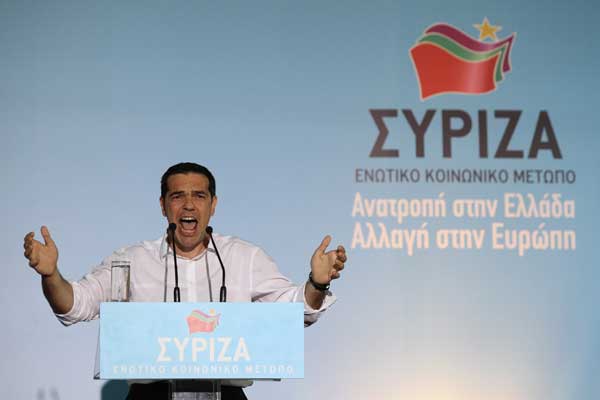After covering the Spanish bailout, I fly from Madrid to Athens. In the taxi rank at Athens airport, iPhone wedged between ear and shoulder, I realise I have crossed both borders without showing my passport. Welcome to Schengenland — how long will it last? Reuters has just published a leak of EU contingency plans for a Greek exit: they involve suspending free movement under the Schengen Agreement, as well as imposing limits on ATM withdrawals and controls on cross-border movement of cash. Somebody texts me: ‘This is irresponsible — it could start a panic in Greece.’ But the Greeks are not flustered. Most of the hot money is long gone from the Greek system. What’s still left — though it’s shrinking by the day — is kept in there as a kind of hedge against unexpected survival.
On Wednesday, we take a long drive into the mountains of Thessaly. Once you’re off the coast road you climb on to a high plain that is, even in high summer, lush and green. The sprinklers are on in every field and — as well as the legumes and walnuts — there are large herds of what look like Jerseys. Their cowbells and the clean air make it feel like Switzerland, albeit Switzerland with 40 degree heat and crazy drivers. The village of Anavra is famous because it’s having to turn people away. Instead of leaving the land, young farmers are making a decent living. There’s been a flood of inquiries from people wanting to move there.
By noon, the tables in the square are littered with beer bottles and cigarette ash: farmers lounge around in their bib-and-brace overalls. They’re full of complaints, of course: which farmer isn’t? They moan about the EU, the low cost of imported meat, the lack of support for cattle farming. Then we get on to politics. I go round the table and, one by one, they tell me they’re going to vote for the far-left party Syriza. ‘Yes, we know there’s a danger he will take us out of the euro, but we have to vote for him. All the others are corrupt.’
The ‘him’ in question is Alexis Tsipras, Syriza’s 38-year-old leader. Since he’s due at a final rally, Newsnight decides that today, Thursday, is ‘Syriza day’ — we will do New Democracy on Friday, prompting instant howls of bias each night from people who don’t see the other report. I speak to Marica Frangakis, a professional economist on Syriza’s central committee. We discuss an interest moratorium, capital controls, default if necessary. Then I ask if she doesn’t fear walking, inadvertently, into a clash with global capitalism and what Greeks call the ‘para-state’. ‘Do you not fear that Tsipras becomes a kind of Greek Allende?’ I ask. This provokes a sharp intake of breath. No, they have not considered this at all.
It’s testimony to the strength of Greek democracy that — despite all the crisis rhetoric in the global press — the actual leadership of the Marxist party that’s so close to power has not really considered the possibility it might provoke an anti-democratic backlash. The rally itself is spectacular but not massive. The party has only 15,000 members and many of those who turn up are old enough to remember the days when the iconic face on their T-shirts was actually alive. It’s Che, of course.
Friday: I do a long interview with Dora Bakoyannis, a veteran conservative leader who’s just returned to membership of New Democracy, having been expelled in 2010 for supporting the first austerity plan (New Democracy opposed it). She ran her own party for 18 months, but now they’ve re-merged with ND. There’s still quite a bit of enmity between the two party machines (each considers the other ‘clientist’). In the plush, cooled offices from which she runs her operation, the chocolate squares in a bowl still have the logo of the old breakaway party on the wrapper. When I jokily point this out, nobody laughs.
Next, it’s back-to-back meetings with a small-business leader and an anarchist writer. The business leader rails at me about fascism: the stormtroopers of Golden Dawn clashed with police near the upmarket shopping district of Kolonaki, terrifying the customers and sending business people into a deep, private gloom. ‘Every security guard is in it, and half the riot police,’ says the businessman. ‘They’re backed by organised criminals — the kind who have SUVs and AK-47s.’ My anarchist contact is no less gloomy. ‘There’s a low-level civil war going on,’ he says: Golden Dawn has been trying to ethnically cleanse an area called Agias Pandelemonos, and the anarchists can only go in there in what he calls ‘kamikaze raids’. Some of those who were at the forefront of last year’s rioting are thinking of leaving the country, or returning to the land. ‘Golden Dawn has appropriated the myth of violence. Before, it was the black bloc who posed as the Robin Hoods of Greece, now it’s them.’
On Sunday, the day of the election results, I’m allowed into the Syriza HQ on condition I don’t bring a camera. For about three hours, as the exit polls come in, I’m a press journalist again. And the Syriza building is something of a throwback to the days of Woodward and Bernstein. We are herded into a room where the party keeps records of its conferences. They’re strictly analogue: box files, with the years stencilled on the side: 2001, 2002. I doubt the person who did the stencilling ever imagined that, in ten years, the party would have won 1.6 million votes, and missed by three percentage points a victory that would have sunk the euro. But that’s exactly what Syriza has just achieved. One of the party’s young journalists spots me and rushes up, beaming. ‘We lost,’ she says. ‘That’s great for us!’
Paul Mason is the economics editor of BBC Newsnight.






Comments